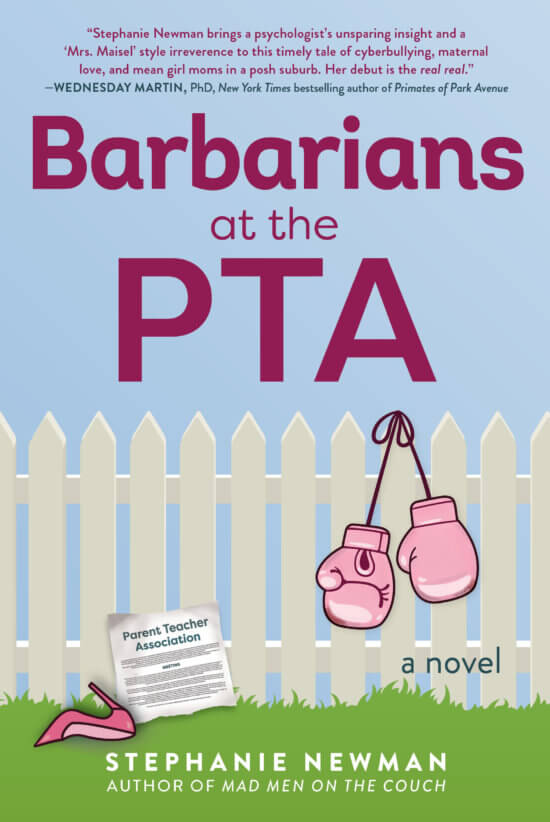
Getty Images
Psychologists’ Strategies for Handling Parenting Dilemmas by Stephanie Newman, PhD
I’m a practicing psychotherapist, which means I’m killing it at parenting. Obviously.
My days flow seamlessly. Late morning. Having finished several virtual therapy sessions, I now stand over a pot of soup–Grandma’s recipe—stirring vigorously. An alert on my phone grabs my attention: time to nab an Instacart slot. Still stirring, I log on with my other hand while glancing over at the laundry (not finished drying yet). Now it’s time for homework review. Linear algebra? No problem! I settle in, lost in equations until the pot begins to boil. Tensions are erupting: two kids, 1 Oreo. I place a hand on each child’s shoulder, being sure to use a voice that is more soothing than scolding: “These are unprecedented times; let’s not argue over minutiae.” My daughter’s face splits into a wide grin, “You’re so right, Mom, I’ll just have the Twizzlers! As she reaches for the candy, her brother waves her off: “Take the cookie, I don’t mind.”
Great kids, I think, as they walk off, arm in arm.
Before the health crisis, I worked mostly in my city office, a somber space in the lobby of a high rise. While there I often fielded questions about the contents of my bookshelf and use of the analytic couch (yup, people still lie down!). Conventional wisdom in my field holds that exploring thoughts and fantasies—even those in the form of questions—can offer insight into the patient’s internal world. Inquiries present an opportunity for learning.
I’d nestle in, buffeted by the tools of the trade: Freud’s Standard Edition, a set of matched chairs and ottomans, woven area rug, and black leather sofa. The neutral set-up offered relative anonymity.
But now with families locked down, parents working from home and kids engaged in remote schooling, we’re all around all the time, with everyone on the Wi-Fi at once. How times have changed.
And psychotherapists have changed with them. We are Zooming and Face Timing, along with the rest of the world–-and in so doing, confronting challenges that emerge when daily realities bump against the treatment frame. During face time sessions, I see my own empathizing eyes, squinting back at me from a corner of the screen. Looking at myself during emotionally poignant moments is the last thing I want to do! It’s jarring to see me starting back at me. Today I lean in for a closer view. I should have combed my hair -and that scarf! I’m never wearing it again!
Virtual engagements are assaulting our boundaries. Most recently I’ve dealt with an onslaught of unexpected background noises. Leaf blowers and family arguments have come out of nowhere, punctuating sessions. I’ve learned to mute my call when stressed voices emanate from the room below. I pound on the floor three times, feeling like a guest at a seedy motel where rooms rent by the hour.
And even though my engagements are virtual, I always make it a point to look professional. I may be cleaning sinks and scrubbing porcelain unmentionables, but I am sure to dress for sessions: black suit jacket, string of pearls, even a pin on my lapel. Below, faded jeans and mocs. In my constant state of mismatch, I’m aware of the stares that follow as I walk the dog outside in between appointments.
And that soup-stirring, delivery-time-reserving, math-reviewing, and peace-brokering moment… never happened, never will. As to the issue of whether my expertise makes me an expert in my own parenting…. Here are some go-to strategies for handling child-rearing and its myriad dilemmas.
PARENTING TIPS
When in doubt, rely on the experts—especially at 3 am when your four year old shakes you awake for the 3rd time in as many nights. Nod vigorously: “Of course you can come into my bed, Sweetie. Just like Dr. Sears says in his book, ‘a need that’s unmet never goes away.”
Use stress-reduction techniques before disciplining. Breathe in and hold… exhale. Repeat. Now you are ready to explain patiently exactly why it’s a bad idea to give the dog pop rocks. “I know you think it’s hilarious the way he tilts and shakes his head as a fountain of spittle erupts inside his tiny terrier mouth, but Daddy will go full blown Krakatoa when Bowzer needs a root canal.
Your pleas didn’t even make a dent?
Back to Stress reduction. This time do it before, during, and after disciplining. When met with a shrill scream: “Stop. I already told you—this is hurting him. He’ll get cavities. Excuse me? Don’t raise your voice. Be respectful.”
“Breathe in. Exhale. Relax. Repeat”.
Still, struggling to find the right way to deal with your young ones?
Talk to them like they are little adults. Explain the reasons you’ve taken a hard stance. Treat children with respect, appeal to their strengths and maturity, and they will rise to the occasion. “Copying Lilly’s history homework was not ok. It’s a kind of cheating called plagiarizing. No, it’s different when people write speeches for famous people. They pay others to do it…. What’s that? No, you cannot pay Lilly to do your work for you.”
Sick of always being the adult (even though, let’s face it, you are), why not write a humor piece about parenting? Just don’t quit your day job.
It’s always an option to pass the buck. Let your child’s [daddy, other mommy, caregiver] handle the discipline, and while you hide in the bathroom.
Assuming you’ve tried it all: explaining, using relaxation strategies, getting your co-parent involved and you’re still flummoxed? If all else fails, go for the Hail Mary: get down on your knees. Light a candle.
One final tip: don’t be shy about seeking professional help. Say it’s been 67 minutes and your teenager is still in the shower. If you’re feeling totally out of your league, thinking when did my kid become a Philip Roth cliché–I’m not touching this, just ask. “I’d like to use my lifeline, Regis, or maybe phone a friend.”
And as to that question of whether we therapist-moms are sitting on a stockpile of trade secrets that allow us to handle parenting better than the rest of the world? You be the judge.
Stephanie Newman Ph.D. is a clinical psychologist/psychoanalyst with offices in New York City and Westchester, NY. She is a Visiting Scholar/Clinical Supervisor at Columbia University, a Member of the Psychoanalytic Association of New York, and the author of an upcoming novel, Barbarians at the PTA.
Barbarians at the PTA is available on Amazon June 2nd!
















